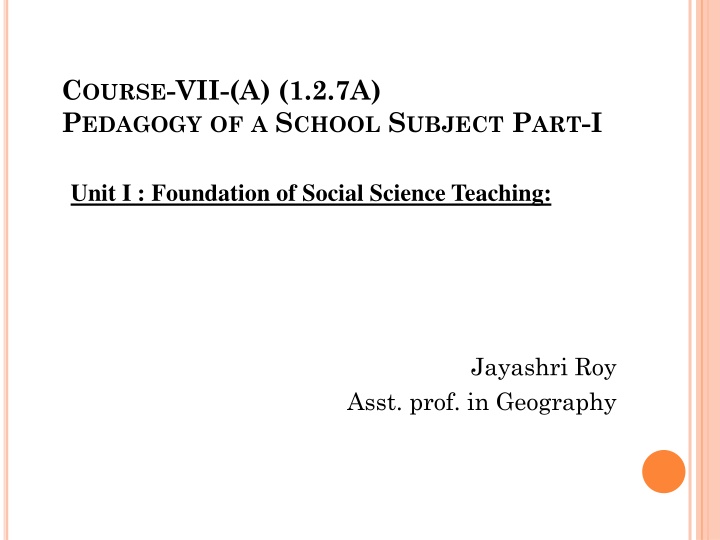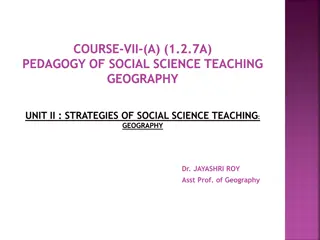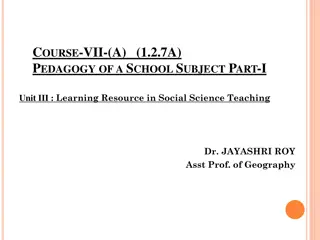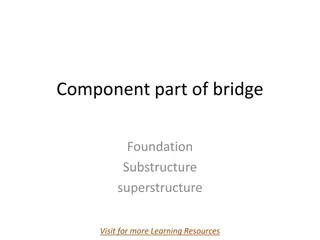Foundations of Social Science Teaching: A Comprehensive Overview
Social science education encompasses various subjects like Economics, Political Science, Geography, History, and Sociology. The objectives include developing critical thinking, understanding societal relationships, and fostering values such as national integration and interdependence. The curriculum focuses on values like social sensibility, problem-solving, and cooperative thinking. The interrelationship of social science branches like Geography, History, Economics, and Political Science is crucial for a holistic education approach.
Download Presentation

Please find below an Image/Link to download the presentation.
The content on the website is provided AS IS for your information and personal use only. It may not be sold, licensed, or shared on other websites without obtaining consent from the author.If you encounter any issues during the download, it is possible that the publisher has removed the file from their server.
You are allowed to download the files provided on this website for personal or commercial use, subject to the condition that they are used lawfully. All files are the property of their respective owners.
The content on the website is provided AS IS for your information and personal use only. It may not be sold, licensed, or shared on other websites without obtaining consent from the author.
E N D
Presentation Transcript
COURSE-VII-(A) (1.2.7A) PEDAGOGY OF A SCHOOL SUBJECT PART-I Unit I : Foundation of Social Science Teaching: Jayashri Roy Asst. prof. in Geography
AIMS OBJECTIVES OF SOCIAL SCIENCE TEACHING Social science is a major category of academic discipline, concerned with society and the relationship among individuals within a society. It has many branches, each of which is considered as social science subject . The main subjects of social sciences included Economics, Political Science, Geography, History and Sociology. The teaching of social sciences has many aims. It has given as follows; General aims Acquiring knowledge The development of reasoning power and critical judgment Training in independent study Formulation of habits and skills Training in desirable patterns of conduct Develop the National Integration and Patriotic sense International Understanding
OBJECTIVES OF SOCIAL SCIENCE TEACHING:GEOGRAPHY To identify the varieties in the distribution of physical and economic phenomena over the surface of the earth To analyze the way of life of the people all over the world To develop an appreciation of interdependence of various geographical regions To develop understanding of the close relationship of human beings with the geography.
SOCIAL SCIENCE CURRICULUM, VALUES OF SOCIAL SCIENCE TEACHING Curriculum is identical with all subjects ideas and principal which cuter as resources or obstacles into the continuous intentional pursuit of a course of action John Dewey. Social science teaching aims at developing values among students. The values to develop have common behavior, regional behavior, cultural behavior and so on. Social sensibility Acquires social experiences Develop Problem solving ability Co-operative thinking Helping mentality Adjustability Thinking and reasoning Integrated thinking Democratic sense Secular sense Patriotic sense Cont .
Psychological Value Scientific Value Vocational Value Utilitarian Value Aesthetic Value Vocational Value Cultural Value Intellectual Value Moral Value Personal values
INTER RELATIONSHIP OF VARIOUS BRANCHES OF SOCIAL SCIENCE Geography History Economics Social Science Political Science Psychology Law Anthropology
DEFINITION OF NATIONAL INTEGRATION Nationalism ordinarily indicates a wider scope of loyalty than patriotism . In addition to ties of lace ,nationalism is evidence by such other favors as race ,language, history, culture and tradition Brubacher Indian society which is filled with diversities is unified by certain emotional forces. This is the process of national integration. The main objective of national integration is to encounter all fissiparious forces. National integration is a complex concept. It has social, political, religious, regional and economic dimensions. The three basic factors of national integration 1. Structural equality 2. 2. Cultural unity 3. 3. Ideological unit
National Integration include: (1) A common citizenship Unity in diversity A feeling of loyalty to the Nation A sense of fraternity among all diverse communities Secularism Freedom of religion (7) Equality (2) (3) (4) (5) (6)
OBSTACTS TO NATIONAL INTEGRATION Provinvialism Linguistic Casteism Classism Socio-economic Inequality Unemployment Poverty Social Disparities Ignorance Lack of National Character Selfishness Untouchability
TEACHER ROLE IN NATIONAL INTEGRATION The teacher has to among the students He should take steps to develop social unity be celebrating festivals of different religious He should develop the feeling of mutual respects tolerance and good will He should never encourage provincialism encourage the feeling of oneness casteism, linguism,
References 1.Dasgupta, J. & Mete,J. (2018). pedagogy of social science teaching (Geography). Aaheli publishers : Kolkata 2.Thakur Chakravorty, M. & Roy, P. (2018-2019) pedagogy of social science teaching (Geography). Rita Book Agency: Kolkata 3. httppl:www.nationalintegration.in
students for any queries, doubts or more information's etc please feel free to phone or mail or whatsapp: jayashriroy19@gmail.com 9434663639























